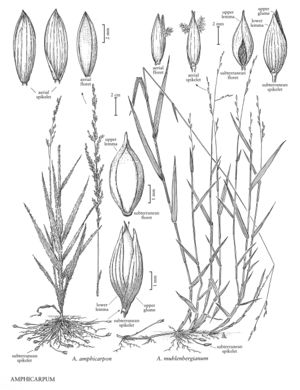Difference between revisions of "Amphicarpum amphicarpon"
Common names: Pursh's blue maidencane Hairy maidencane
Synonyms: Amphicarpum purshii
Treatment appears in FNA Volume 25. Treatment on page 387.
imported>Volume Importer |
imported>Volume Importer |
||
| Line 41: | Line 41: | ||
|publication year= | |publication year= | ||
|special status= | |special status= | ||
| − | |source xml=https://bitbucket.org/aafc-mbb/fna-data-curation/src/ | + | |source xml=https://bitbucket.org/aafc-mbb/fna-data-curation/src/200273ad09963decb8fc72550212de541d86569d/coarse_grained_fna_xml/V25/V25_1097.xml |
|subfamily=Poaceae subfam. Panicoideae | |subfamily=Poaceae subfam. Panicoideae | ||
|tribe=Poaceae tribe Paniceae | |tribe=Poaceae tribe Paniceae | ||
Latest revision as of 17:55, 11 May 2021
Plants annual. Culms 30-80 cm, erect. Leaves mostly basal; sheaths hirsute; blades 10-15 cm long, 5-15 mm wide, hirsute on both surfaces, margins ciliate. Subterranean spikelets 7-8 mm, acuminate. Aerial panicles 3-20 cm; aerial spikelets 4-5 mm, ellipsoidal. 2n = 18.
Discussion
Amphicarpum amphicarpon grows in sandy pinelands of the eastern United States. It used to be known as A. purshii Kunth, but A. amphicarpon has priority.
Selected References
None.
Lower Taxa
None.
... more about "Amphicarpum amphicarpon"
